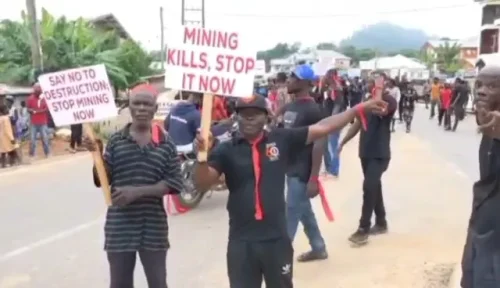Residents of Bompata in Ghana’s Ashanti Region staged a protest on Sunday against illegal mining activities that they say are destroying cocoa farms, polluting streams, and threatening their livelihoods.
The protesters from the Asante Akyem South Municipality are calling on the Asantehene, Otumfuo Osei Tutu II, to intervene as they accuse local authorities of failing to stop miners, some of whom claim to possess operating permits. The demonstration took place on November 2 as community members expressed frustration over environmental degradation caused by galamsey, the local term for illegal mining.
Joseph Baah, a community leader, told reporters after the demonstration that residents want no mining activity in their area because their livelihoods are at stake. He urged police at Juaso and Konongo to act and appealed to the Asantehene to save the community from the miners’ destructive operations.
Baah emphasized that residents have witnessed how galamsey has ravaged farmlands and destroyed water bodies in other parts of the country and are determined to prevent similar devastation in Bompata. He noted that the community has spoken with a strong voice, invoking the principle that the voice of the people is the voice of God.
Residents said the miners have uprooted cocoa trees and contaminated soil and water bodies that are vital to farming and daily life. They questioned the legitimacy of the miners’ permits and accused the operators of working under protection from unidentified officials, suggesting that corruption or political influence may be shielding the illegal activities.
The Asantehene, revered as the traditional ruler of the Ashanti Kingdom, has previously led campaigns against illegal mining, warning that galamsey poses an existential threat to Ghana’s environment and future generations. His intervention is seen as crucial because traditional authorities often command significant influence in their jurisdictions and can mobilize resources and political pressure that exceed what local communities can achieve alone.
The protest adds to growing tension in parts of the Ashanti Region, where illegal mining has surged despite government crackdowns and repeated pledges to restore degraded lands. The proliferation of galamsey operations continues even as national authorities deploy task forces and implement policies designed to eliminate the practice.
Cocoa farming represents a critical economic activity for communities in the Ashanti Region, and the destruction of cocoa trees directly threatens household incomes and food security. Ghana remains one of the world’s leading cocoa producers, and damage to cocoa farms undermines both local livelihoods and national export revenues.
The contamination of water bodies poses additional health risks for residents who depend on local streams for drinking water, cooking, and sanitation. Mining activities typically introduce mercury and other toxic substances into water systems, creating long-term environmental and public health challenges that persist even after operations cease.
Local officials from the Asante Akyem South Municipal Assembly have yet to comment on the residents’ demands or explain why enforcement actions have not been taken against the miners despite community complaints. The silence from municipal authorities reinforces resident perceptions that local government has either failed to prioritize their concerns or lacks the capacity to confront well-connected mining operators.
The appeal to the Asantehene reflects a broader pattern in Ghana where communities turn to traditional leaders when formal government structures appear unresponsive or ineffective. Traditional rulers possess moral authority and cultural legitimacy that can sometimes compel action where bureaucratic processes have stalled.
The Bompata protest mirrors similar demonstrations across Ghana’s mining regions as communities increasingly mobilize against environmental destruction. Recent months have seen heightened public awareness about galamsey’s devastating impact on water quality, with major rivers including the Pra, Ankobra, and Birim becoming heavily polluted and threatening water supply for millions of Ghanaians.
The government has deployed security forces through operations like NAIMOS to combat illegal mining, but enforcement remains inconsistent and some residents allege that certain operators benefit from political protection that shields them from prosecution. The disconnect between national anti-galamsey rhetoric and local enforcement realities fuels community frustration and drives protests like the one in Bompata.
Source: newsghana.com.gh











